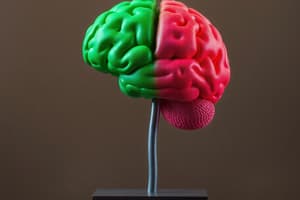Podcast
Questions and Answers
Which mental model emphasizes simplifying explanations by selecting the one with the fewest assumptions?
Which mental model emphasizes simplifying explanations by selecting the one with the fewest assumptions?
- Second-Order Thinking
- Circle of Competence
- First Principles Thinking
- Occam's Razor (correct)
A project manager consistently checks for unintended consequences before implementing new strategies. Which mental model is exemplified by this practice?
A project manager consistently checks for unintended consequences before implementing new strategies. Which mental model is exemplified by this practice?
- First Principles Thinking
- Second-Order Thinking (correct)
- Probabilistic Thinking
- Inversion Thinking
What is the primary goal of 'First Principles Thinking'?
What is the primary goal of 'First Principles Thinking'?
- Relying on common analogies to solve problems quickly
- Understanding the limits of one's knowledge to avoid mistakes
- Accepting assumptions as correct and using as guidelines
- Breaking down problems to fundamental truths and reconstructing solutions from scratch (correct)
Which cognitive bias is characterized by taking action, even when it is not the optimal choice, simply because doing something feels better than inaction?
Which cognitive bias is characterized by taking action, even when it is not the optimal choice, simply because doing something feels better than inaction?
How does 'Social Proof' impact decision making in uncertain situations?
How does 'Social Proof' impact decision making in uncertain situations?
How can Pavlovian conditioning be applied in a management setting?
How can Pavlovian conditioning be applied in a management setting?
If a company's sales drastically decline after an unusually successful month, which statistical phenomenon might explain this?
If a company's sales drastically decline after an unusually successful month, which statistical phenomenon might explain this?
According to the Power Law, how should a business best allocate its resources for marketing based on this principle?
According to the Power Law, how should a business best allocate its resources for marketing based on this principle?
When is it appropriate to use controlled experiments and data analysis?
When is it appropriate to use controlled experiments and data analysis?
A consulting firm analyzes only companies that have succeeded in a particular market, drawing conclusions without examining the failed ones. What bias are they exhibiting?
A consulting firm analyzes only companies that have succeeded in a particular market, drawing conclusions without examining the failed ones. What bias are they exhibiting?
In talent management, how does the Matthew Effect influence the allocation of resources for leadership development?
In talent management, how does the Matthew Effect influence the allocation of resources for leadership development?
How can a company use incentives to align employee behavior with company goals?
How can a company use incentives to align employee behavior with company goals?
Which mental model is used when companies invest in certifications or awards to demonstrate quality and reliability?
Which mental model is used when companies invest in certifications or awards to demonstrate quality and reliability?
Which principle is violated when too many stakeholders have rights over a resource, and its use becomes inefficient or blocked?
Which principle is violated when too many stakeholders have rights over a resource, and its use becomes inefficient or blocked?
How can Alternative Histories be applied in strategic management?
How can Alternative Histories be applied in strategic management?
What does 'Critical Mass' refer to in the context of network-based business models or product launches?
What does 'Critical Mass' refer to in the context of network-based business models or product launches?
How do feedback loops improve service quality and operational efficiency?
How do feedback loops improve service quality and operational efficiency?
In medical research, what does it mean when a study finds a result that is statistically significant?
In medical research, what does it mean when a study finds a result that is statistically significant?
What key question should you ask when you hear that 'there is no evidence that A causes B'?
What key question should you ask when you hear that 'there is no evidence that A causes B'?
What can be concluded if a study lacks statistical significance?
What can be concluded if a study lacks statistical significance?
What is 'regression to the mean'?
What is 'regression to the mean'?
What error is being made when a business owner attributes an employees average performance year to a new training strategy?
What error is being made when a business owner attributes an employees average performance year to a new training strategy?
How should one avoid mistakes caused by 'regression to the mean'?
How should one avoid mistakes caused by 'regression to the mean'?
When can a correlation imply causation?
When can a correlation imply causation?
What approach ensures causation is correctly found?
What approach ensures causation is correctly found?
A company replaces a non-charismatic CEO with a charismatic one and sees a surge in innovation. Why might this conclusion be misleading?
A company replaces a non-charismatic CEO with a charismatic one and sees a surge in innovation. Why might this conclusion be misleading?
What is required to establish causation?
What is required to establish causation?
The causal inference condition that means cause and effect must be correlated, beyond random chance is which of the following?
The causal inference condition that means cause and effect must be correlated, beyond random chance is which of the following?
Why could a study of VC funds and portfolio company performance be misleading?
Why could a study of VC funds and portfolio company performance be misleading?
Refering to changes in subjects that occur naturally after treatment or intervention is known as:
Refering to changes in subjects that occur naturally after treatment or intervention is known as:
What is one way that the effects of maruration can be removed?
What is one way that the effects of maruration can be removed?
What is the term for when prices eventually climb and attract new investments?
What is the term for when prices eventually climb and attract new investments?
Investment cycles are about the industry and understanding where capital is to make strategic investment decisions, why is this?
Investment cycles are about the industry and understanding where capital is to make strategic investment decisions, why is this?
How do individuals change behavior based on the economic situation?
How do individuals change behavior based on the economic situation?
Which one of these is not a part of signaling theory?
Which one of these is not a part of signaling theory?
What makes a signal credible in signaling theory?
What makes a signal credible in signaling theory?
Flashcards
The Map Is Not the Territory
The Map Is Not the Territory
Simplifications of reality that aren't the real thing, understanding limitations helps make better decisions.
First Principles Thinking
First Principles Thinking
Breaking problems down to fundamental truths and reconstructing solutions from scratch, instead of relying on assumptions or analogies.
Second-Order Thinking
Second-Order Thinking
Considering the consequences of actions beyond the immediate effect to avoid unintended negative outcomes.
Occam's Razor
Occam's Razor
Signup and view all the flashcards
Circle of Competence
Circle of Competence
Signup and view all the flashcards
Feedback Loops
Feedback Loops
Signup and view all the flashcards
Probabilistic Thinking
Probabilistic Thinking
Signup and view all the flashcards
Inversion Thinking
Inversion Thinking
Signup and view all the flashcards
Do Something Bias
Do Something Bias
Signup and view all the flashcards
Social Proof
Social Proof
Signup and view all the flashcards
Pavlovian Conditioning
Pavlovian Conditioning
Signup and view all the flashcards
Mean Reversion
Mean Reversion
Signup and view all the flashcards
Power Law
Power Law
Signup and view all the flashcards
Causal Inference
Causal Inference
Signup and view all the flashcards
Survivorship Bias
Survivorship Bias
Signup and view all the flashcards
Matthew Effect
Matthew Effect
Signup and view all the flashcards
Incentives
Incentives
Signup and view all the flashcards
Signalling
Signalling
Signup and view all the flashcards
Tragedy of the Anti-Commons
Tragedy of the Anti-Commons
Signup and view all the flashcards
Alternative Histories
Alternative Histories
Signup and view all the flashcards
Critical Mass
Critical Mass
Signup and view all the flashcards
Feedback Loops
Feedback Loops
Signup and view all the flashcards
Statistical Significance ≠ Clinical Importance
Statistical Significance ≠ Clinical Importance
Signup and view all the flashcards
Lack of Statistical Significance
Lack of Statistical Significance
Signup and view all the flashcards
Regression to the mean
Regression to the mean
Signup and view all the flashcards
Misattributing Causes
Misattributing Causes
Signup and view all the flashcards
Correlation vs. Causation
Correlation vs. Causation
Signup and view all the flashcards
Alternative Events
Alternative Events
Signup and view all the flashcards
Maturation
Maturation
Signup and view all the flashcards
The Capital Cycle
The Capital Cycle
Signup and view all the flashcards
Organizational Implications
Organizational Implications
Signup and view all the flashcards
Speculation
Speculation
Signup and view all the flashcards
Herd Mentality
Herd Mentality
Signup and view all the flashcards
Valuation Bubble
Valuation Bubble
Signup and view all the flashcards
Signaling theory
Signaling theory
Signup and view all the flashcards
Principal-Agent Problem
Principal-Agent Problem
Signup and view all the flashcards
Study Notes
- Shane Parrish and Rhiannon Beaubien authored "The Great Mental Models Volume 1: General Thinking Concepts" which is part of a series on mental models to improve decision-making and world understanding
- The book focuses on general thinking concepts from philosophy, physics, and biology.
Mental Models
- Representations of reality simplify the real thing, thus understanding their limitations helps in making better decisions
- First Principles Thinking means breaking down problems to fundamental truths and reconstructing solutions from scratch, used by innovators like Elon Musk
- Second-Order Thinking entails considering effects beyond the immediate when making decisions, leading to more sustainable outcomes
- Occam’s Razor suggests the simplest explanation is often the most likely, helping to cut unnecessary assumptions
- Circle of Competence is about understanding the limits of your knowledge for informed decisions; Warren Buffett applies this in his investment strategy
- Understanding positive and negative feedback loops helps to influence complex systems, like economies or personal growth
- Probabilistic Thinking involves using probability to evaluate risks for more rational decisions amid uncertainty
- Inversion Thinking is to look at problems in reverse assists in identifying hidden risks and improves strategies
Psychology
- Do Something Bias means action is prioritized over inaction, even if it is not the most optimal path
- The Management application here is to implement iterative changes to signal progress
- Social Proof is the tendency to follow others' actions, particularly in uncertain situations
- In Management, showcasing early adopters can encourage acceptance of new products
- Pavlovian Conditioning is a learning process by which a neutral stimulus becomes associated with a rewarding one
- Employee recognition programs apply Pavlovian Conditioning to drive performance via positive feedback
Statistics
- Mean Reversion is the idea that extreme performances tend to return to the average over time.
- In Management fluctuations should be normalized over time and avoided
- Power Law means a small number of events or entities account for a large proportion of the effect/value
- Focus resources on the vital few customers/products that generate the majority of revenue when using Power Law
- Causal Inference determines whether a relationship between two variables is causal, not merely correlated
- Use controlled experiments/data analysis to ensure observed effects are truly caused by the intervention
- Survivorship Bias focuses only on successful cases while potentially ignoring those that failed
- Consider failed initiatives for a balanced understanding of risks/challenges when benchmarking best practices
Economics
- Matthew Effect describes the phenomenon where initial advantages compound over time, enriching the already rich
- The management application involves recognizing early high performers but not overlooking hidden talent for development
- Incentives are rewards or penalties that motivate behavior
- Use performance-based bonus systems to motivate employees to meet/exceed goals
- Signaling involves using observable actions/attributes to convey qualities/intentions
- Use certifications/awards to signal quality and enhance reputation as part of signalling
- Tragedy of the Anti-Commons describes the events whereby too many stakeholders hold rights over a resource, its use becomes inefficient/blocked
- Streamline ownership/licensing agreements to prevent bottlenecks and promote innovation
Physics & Mathematics
- Alternative Histories are "what-if" scenarios explored for different outcomes
- Scenario planning, used in strategic management can anticipate futures and develop contingency plans
- Critical Mass is threshold when a growing entity becomes self-sustaining and drives growth
- Achieving sufficient user base is essential to generate momentum and long-term success
- Feedback Loops describes the process where outputs of a system are circled back as inputs, reinforcing/dampening subsequent behavior
- Regular performance reviews and customer feedback systems create positive feedback loops that improve service quality and operational efficiency
Psychology in Mental Models
- Do Something Bias: It involves taking needless action, even if nothing would be better
- Taking unnecessary action rather than waiting for more data is how it applies in management
- Social Proof: Copying actions of others in uncertain situations
- Using customer testimonials/market trends to influence decisions is a key way social proof is used
- Pavlovian Conditioning is the act Associating a stimulus with a response through exposure
- Brand marketing is associating logos/sounds w/ positive emotions
Statistics in Mental Models
- Mean Reversion means extreme events tend to be followed by more average outcomes
- In Management, a company's sudden success/failure stabilizes over time
- Power Law: A few high-impact events dominate outcomes (80/20 rule)
- In Management, the customers from the small percentage drive most of a company's revenue
- Causal Inference describes how understanding cause-and-effect relationships work
- Avoiding false correlations when making strategic decisions is an important use
- Survivorship Bias focuses only on successful examples while ignoring failures
- Learning from failed business, not just successful ones can ensure you learn better for the future
Economics in Mental Models
- Matthew Effect means initial advantages compound over time to keep the rich rich
- Market leaders tend to attract more resources and customer
- Incentives are the reasons People behave in rewards + penalties
- Structuring employee bonuses to drive productivity helps keep people honest
- Signaling works by taking actions to demonstrate credibility/competence
- Use advertisement of certifications to gain customer trust
- Tragedy of Anti-Commons mean too many owners blocking access to shared access
- Bureaucracy can slow down decision making
Physics & Math in Mental Models
- Alternative Histories involves accounting for any potential futures
- Using scenario planning helps prepare for different market conditions
- Critical Mass is a point where momentum makes further growth inevitable. Startups need enough users to reach network effects
- Feedback Loop means the outcome of a process reinforces or counteracts, customer reviews influence sales and create reinforcing cycle
Common Problem with Statistical Significance
- Statistical Significance ≠ Clinical Importance
- A study might be statistically significant and may not be medically relevant as the finding may not be a major one
- A study might not find statistically significance which doesn't mean it is non existent, it just shows the study was not big enough
Negative Trial Results
- Studies showing a difference between treatment may sometime be "negative" to portray there is no effect
- This is potentially misleading and in reality, they lack enough data to prove a effect.
Misinterpretation in Small Case Studies
- Variceal bleeding of a trial comparing two treatments for 100 patients and 1800 was required for valid results
- This means researchers incorrectly deducted two treatments are equaly effective
- Many trials are too small to be able to detect any meaningful effects and prevent the real treatment from materializing.
- Always ask when seeing data if it is high quality and uses what the confidence interval is.
Regression to the Mean
- Regression to the mean is the notion to describe that there are deviations to go back to how things actually are
- Random factors and outside events influence extreme events.
- Do not make Bad Management call based on one sample
- Understand that we often think there is a link when there is actually not
Correlation VS Causation
- If there is a correlation vs causation, it means it is not an issue where it is linked to x and y
- Ensure there are other factors
- It might be a pre existing trend that has been happening for a while
Understanding causation
- Relationship must be intwined
- Studies are often reported but need clear process
- Natural experiments should be used with clear data.
- Threats to causal can be that it is not randomly selected
Alternative Events Defined
- Refer alternative accounts
- Should use a control group
- Understanding regression accounts can influence natural progression
Capital Cycle Dynamics
- The capital cycle describes investment flows that go into high return
- Phases of cycles are the expansion phase, overcapacity phase, industry consolidations, recovery cycle
- Always avoid over investing
Responding in Economic Cycles
- Focus on performance
- Apply it as it aligns with organizations
- Always check the speculation and see the economic impact
- Align compensations
- Also consider the cultural changes needed in times
- Always analyze the management in the best way and the short terms
- Focus on causality in social science
- Look for an association between the two
- Should not be due to other variables.
- Must be testable and correlated.
Signaling Theory
- One party convey information to the receiver
- Should be ethical in the analysis'
- Should be able to observe the signal and it must be costly.
Studying That Suits You
Use AI to generate personalized quizzes and flashcards to suit your learning preferences.





